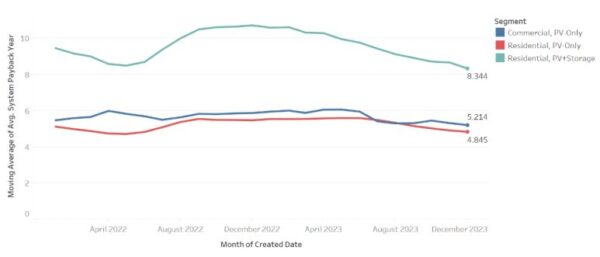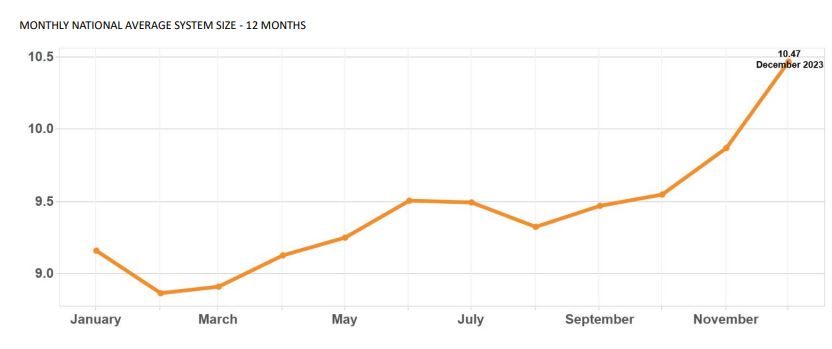New data from SunWiz shows that PV panel and system prices are at the lowest point they have been in 12 months but the average investment in a rooftop solar system remains steady with Australian households preferring to install larger systems as they combat rising electricity prices.
In its latest quarterly market update, SunWiz said wholesale pricing for panels and inverters have been on the decline in recent months while system prices fell in December 2023 to an average of AUS 1.01 ($0.66)/W – the lowest they have been since May 2022.
Despite the drop off in prices, SunWiz Managing Director Warwick Johnston said consumers are continuing to invest about AUD 9,000 per rooftop installation. They are opting for larger systems, with the average system size increasing to almost 10.5 kW in the final month of 2023.
“What we have seen in consumer spend, even as panel and system prices have come down, is that people are buying bigger systems,” he said. “They are spending the same amount as they did previously. Even as prices have come down, people have still been paying that AUD 9,000 mark because they’re buying bigger systems. The other way that they’re doing it is buying cheaper equipment.”
Johnston said consumers have been trending away from premium panels and they are now also trending away from premium inverters.
“It used to be that they put Chinese panels on a premium inverter and nowadays half of the volume is Chinese panels on a Chinese inverter,” he said.
Popular content
The trend for increased capacity saw the average size of a rooftop solar system cross the 10 kW threshold for the first time in December 2023. Driven in part by an increase in commercial installations, the average size of a rooftop system rose to an all-time high of 10.47 kW.
The increase follows considerable growth in the volume of 10-15 kW systems and modest growth in the 8 kW to 10 kW segment. The volume of 6 kW systems has been trending slowly downwards.

Johnston said the figures also showed the payback period for rooftop solar investments is trending downwards with most installations paying for themselves in less than five years and households in some states, including Queensland, better off financially in as little as three years.
“It’s the healthiest payback period for a residential system for quite a while,” he said.
More than one in three Australian households have rooftop solar systems – the highest penetration in the world. Australia now sits at 3.7 GW of small-scale volume with about 23 million projects installed to date.
This content is protected by copyright and may not be reused. If you want to cooperate with us and would like to reuse some of our content, please contact: editors@pv-magazine.com.



What max size of inverter are you allowed to use by the grid in domestic rooftop solar in Queensland . Or is batteries taking any excess ?
It is better to go bigger, but it is also worth looking in to a battery for evening, night use. As most people are not home during the day